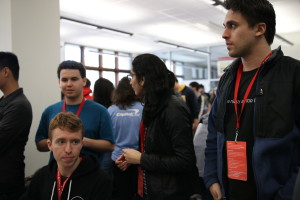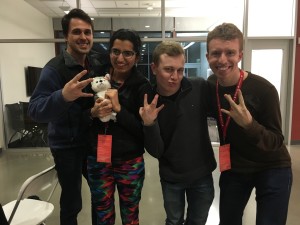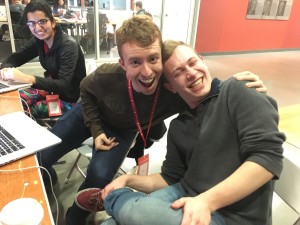
“I really enjoyed walking the Dish,” said Grant Timmerman, a veteran hacker from the University of Washington (U-Dub) and organizer of DubHacks. The group erupted in laughter after his comment.
“The car ride was very interesting…. We got really close,” a team member said in explanation of the laughter. “Uber had a surge pricing of 1.8x, so we decided to ride with Grant’s coworker.”
“There was seven of us who were all going to ride in this Mazda 3, and everyone was wondering how [we would fit],” another added.
“The sun was beautiful, slowly setting behind the golden California hills,“ Strimling said.
Three days later, Timmerman was still recalling what really went down during the car ride.
“I took the initiative and crawled, literally, into the back, and we made it work,” Timmerman said. “We made it out just before the gates closed, but it was worth it.”
“But really, it was a fantastic break from hacking and an amazing California experience my friends and I will never forget,” he added.
The members of Pulse were both focused and relaxed, a balance unique amidst the chaos of coding. Like every other group, they had ideas to hash, bugs to fix and platforms to learn, but the U-Dub students embraced the California calmness. The group coded throughout the weekend, but they also made it a goal to take breaks every few hours, making their design process more productive in the long term. Despite this group’s expertise, their main goals included meeting interesting people and learning new software rather than the sole purpose of winning a prize.
“I’m here to have fun, learn a lot about biotech and create something that we are truly proud of; and hopefully create something useful,” Timmerman said.

Why did this team work so well? According to Pooja Sethi, it definitely helped to know each other and attend the same university, but Sam Daitzman explained that their groupmates’ friendly approach and easygoing manner is what resulted in their forming a team. Daitzman, a high school student from Massachusetts joined the group on Saturday morning after his original team disbanded.
Strimling, despite the amount of time he spent with the group over the weekend, was in fact a TreeHacks mentor and not a member of the team. He has participated in and mentored at previous hackathons and explained that he enjoys giving advice to participants. He talked about how he “saved” one TreeHacks team of new hackers by showing them a new framework.
“Now whenever [they] see me, they always give me hugs,” Strimling said.
“More and more beginners are participating in these hackathons, and it’s really fun to help them out with programs I struggled with when I started,” he added.
As a sophomore studying computational and applied mathematics at U-Dub, Strimling is actually younger than all of the Pulse team members, except for Daitzman. Yet, his guidance and occasional jokes helped define the team’s spirit for the weekend, and Timmerman used Strimling’s personality to better define the group’s dynamic.
“Let’s call it the Will Factor,” Timmerman said.
Creating a community
While they all have considerable knowledge about coding, each team member has different strengths that contributed to the overall success of the product. Catering the tasks to each member’s expertise helped the project flow.
“It’s not only about technical skills and what you learn; it’s also about the community,” said teammate Lucas Colusso, a Ph.D. student at U-Dub focused on human-centered design & engineering.
As the designer, Colusso was able to better collaborate with the coders as a result of his coding experience, which he feels played a big part in team communication.
“[Having coding background is useful] so you don’t create intricate designs that are too complex to code,” he said.
Grant and Sethi were in charge of the coding to produce the prototype, while Daitzman worked on the survey screen layouts of the app.
Collaboration with Stanford Medicine was also integral for the group: Sending their designs to doctors and getting detailed feedback was incredibly valuable. After being contacted by the team through help from the TreeHacks Health vertical, Anthony Bertrand ’07, doctor and graduate student at Stanford’s Graduate School of Business, stopped by the team’s home base and provided constructive feedback for Pulse.
Each team member also agreed that their democratic system of deciding on a project helped them finish their hack on schedule, with extra time to add more features to their app.

Decoding TreeHacks
The dynamics of Pulse highlighted their diversity not only in skills, but also in personalities. But their “Will Factor” also stemmed from relaxing and enjoying everything TreeHacks had to offer: from running down the stairs for boba to hiking the Dish.
Coders at TreeHacks played with photo booths, put their hearts and souls into Zumba and participated in yoga sessions. Students met new people and explored cool inventions, while appreciating Stanford’s vibrant community — in essence, TreeHacks embodied the Will Factor.
“I really like the energy [at TreeHacks],” Sethi said. “People are really happy to be here and excited about what they’re working on — it’s contagious.”
Contact Isabela Bumanlag at isabela7 ‘at’ stanford.edu.
